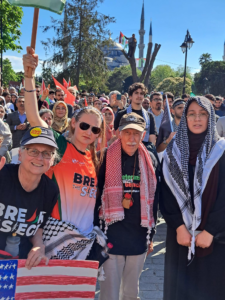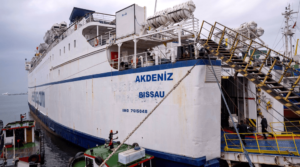
Coleen Rowley (front left) and Barry Riesch (third from left)
BY CRAIG WOOD
Two gutsy activists from antiwar groups officing out of 4200 Cedar Ave. in South Minneapolis flew to Istanbul, Turkey, on April 17 to join over 300 others from about 40 countries on an 1,100-mile voyage across the Mediterranean Sea to raise awareness and bring lifesaving aid to Gaza.
Vietnam vet and member of Veterans For Peace (VFP) Barry Riesch from St. Paul was nervous about signing on with the Freedom Flotilla Coalition (FFC) but felt he should try to do something for the vast majority of Gazans lacking medical care and being deliberately starved. Apart from the mission’s goal of delivering over 5,000 tons of urgently needed food, water and medical supplies (including five ambulances and an abundance of baby formula), Riesch said he wanted to do this for his grandkids in hopes that “they won’t have to grow up in a world that would ignore such a tragedy.”
Riesch has good reason to be nervous. Since the Free Gaza Movement began in 2006, only a handful of small ships have been allowed to bring humanitarian aid to Gazans. Retired U.S. Army colonel and former diplomat Ann Wright is a member of the 2024 FFC Steering Committee. She was a participant (resister) on five previous flotillas that never reached Gaza. In 2010 Wright watched Israeli troops rappelling from helicopters onto the deck of the Mavi Marmara from a nearby boat. Nine resisters were killed and 50 more wounded after some of them allegedly tried to fight back in international waters against the Israeli invaders who were using pressurized water hoses on them. In a video, Wright gave other accounts of Israeli troops harassing and beating resisters before confiscating their belongs and taking them against their will to Israeli jails until they could be deported.
Israeli Prime Minister Netanyahu contends that Israel has been unfairly targeted by resisters trying to break his country’s illegal naval blockade and bring humanitarian aid into Gaza. During a 2015 speech in Tel Aviv he told the Jewish Agency Assembly, “They send flotillas to Gaza, they don’t send flotillas to Syria. It’s amazing, this travesty of justice, this violation of the truth, the rape of truth.”
Former FBI agent and whistleblower Coleen Rowley of suburban Minneapolis, who is a member of VFP and Women Against Military Madness (WAMM), couldn’t disagree with Netanyahu more. She hopes that he and his cronies will be called to answer for their criminal behavior sooner than later. Rowley has been speaking at academic and other professional venues with an emphasis on ethical decision-making for 20 years. Before flying to Istanbul, she spoke on the phone with me about the “berserk Israelis” who have “shredded the law” — not only breaking the rules of the high seas for murder and kidnapping, but also committing ongoing violations of international humanitarian law and war crimes on land. In a recent television interview, Rowley said, “I told people I can’t help seeing the faces of my own grandchildren (I have five grandchildren now) in the faces of these poor Gazan children who are being orphaned, starved and murdered.”

The flotilla cargo ship in Istanbul (Photo/Medea Benjamin)
Riesch and Rowley attended intensive nonviolence training shortly after arriving in Istanbul. “The most frightening part of the training was a simulation replete with deafening booms of gunfire and exploding percussion grenades and masked soldiers screaming at us, hitting us with simulated rifles, dragging us across the floor, and arresting us,” author/activist Medea Benjamin wrote in a Counterpunch article. During an April 19 Zoom meeting in Istanbul, resisters discussed their fears about the trip. One recalled a mock situation where three doctors from New Zealand laid on the floor during a seminar and instructed resisters on what to do if their heads are stepped on in the dark. Lawyers provided legal advice about separating “false authority” from “legitimate authority,” along with tips for walking away from precarious situations. Despite their fears, resisters believe what they are doing not only has to be done, but it is also morally and legally justifiable, citing a recent ruling by the International Court of Justice (ICJ) that it is “plausible” Israel has committed acts of genocide. The court further maintains that it is now incumbent upon citizens and governments of the world to do what they can to stop the genocide.
The location of the launch was kept secret due to Israel’s history of sabotaging boats in port and the departure dates were pushed back repeatedly because of outside pressures — mostly from the Israeli and U.S. governments. Last week the Israelis made an announcement about intercepting the flotilla that prompted Huwaida Arraf, U.S. human rights attorney and FFC Steering Committee member to say, “Governments must refuse to collaborate in maintaining Israel’s illegal siege on Gaza by obstructing the flotilla in any way. We call on the governments of the 40 countries represented on the Freedom Flotilla to uphold their obligations under international law and demand that Israel guarantee the flotilla safe passage to Gaza.” Soon after, U.N. experts reaffirmed Arraf’s demand: “As the Freedom Flotilla approaches Palestinian territorial waters off Gaza, Israel must adhere to international law, including recent orders from the International Court of Justice to insure unimpeded access for humanitarian aid.”
But on April 26, the doubts crept home. During a morning call, Riesch talked about his dwindling hopes that the flotilla would make it to Gaza, saying, “Now there’s a problem with ship flags … this is the fourth delay.” According to Reuters, Guinea-Bissau decided to remove its flag from flotilla boats. Istanbul activists answered with this: “The Guinea-Bissau International Ships Registry (GBISR), in a blatantly political move, informed the Freedom Flotilla Coalition that it had withdrawn the Guinea-Bissau flag from two of the Freedom Flotilla’s ships, one of which is our cargo ship.”
Riesch also mentioned that frustrated resisters were already drifting away, and during the previous night’s FFC meeting, he found out numerous other boats loaded with activists were preparing to join the flotilla in a show of solidarity, even though Israelis planned to stop them with a blockade. So it was decided the flotilla would meet up with the blockade and wait a few days before turning around. The earliest departure time, Reisch said, would be Sunday, April 28 — if they could clear customs. Later that evening he sent a text saying the trip was canceled.
During a follow-up Q&A TikTok post, Wright told Benjamin that Israel always uses delay tactics before flotilla launches and the State Department invariably issues travel warnings and cautions Americans about challenging the Israeli government — especially now since the U.S. has been so openly complicit with the ongoing ethnic cleansing in Gaza. While support for the flotilla remains high among Turkish nationals, Wright strongly believes the U.S. is using economic pressures, including military aid, to derail the project in Turkey.
If nothing else, those who traveled to Istanbul succeeded in bringing much-needed attention to the plight of captive and undernourished Palestinians waiting in refugee camps for the next bombing campaign. About 45% of the people living in Gaza are children under the age of 15. So far, well over 100,000 Palestinians have been killed or wounded — most of them, women and children. The latest consensus is that it will take over a decade to rebuild the parts of Gaza already destroyed, but for now, resisters are packing their bags — some of them hope to return this summer.






















